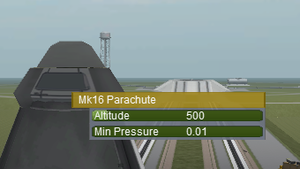Difference between revisions of "Tweakables"
From Kerbal Space Program Wiki
(→Usage) |
m (Added move request) |
||
| Line 1: | Line 1: | ||
{{Stub}} | {{Stub}} | ||
| + | {{Move|Tweakables|Describes a system, not a specific thing, so it's logical for it to be plural.}} | ||
[[File:Tweakable.png|thumb|A tweakable [[Mk16 Parachute]]]] | [[File:Tweakable.png|thumb|A tweakable [[Mk16 Parachute]]]] | ||
'''Tweakables''' are a system added in [[0.23|version 0.23]] to set specific properties while in the [[Vehicle Assembly Building]] or | '''Tweakables''' are a system added in [[0.23|version 0.23]] to set specific properties while in the [[Vehicle Assembly Building]] or | ||
Revision as of 07:11, 10 May 2015

A tweakable Mk16 Parachute
Tweakables are a system added in version 0.23 to set specific properties while in the Vehicle Assembly Building or Space Plane Hangar prior to launch. The major advantage is that these properties are stored with the craft scheme in the building, so they stay the same for every launch.
Properties
The following properties are changeable while building:
- The percentage of thrust an engine can use (Thrust Limiter).
- Resource levels of parts which contain them (i.e. liquid fuel tanks), in multiples of 10% of total capacity.
- Color of active lights (RGB)
- Whether landing gear begin deployed or retracted when launched.
- Whether landing gear or wheels can be steered.
- Whether steerable landing gear or wheels use inverted steering.
- Altitude at which parachutes fully deploy and minimum air pressure to fully deploy (seen in picture).
- Whether control surfaces and pivoting winglets are active in pitch, yaw, or roll commands.
- Whether a flag decal is displayed on parts which support them (i.e. command pods).
Usage
There are a lot of possible usages for tweakables.
- To provide a more efficient ascent in rockets with solid fuel boosters by lowering the TWR.
- Store only liquid fuel in some adapters used in aircraft, such as the Mk2 to 1.25m Adapter.
- Provide empty fuel tanks to be filled in orbit, often used in interplanetary spaceship assembly, or to use fuel tanks as a structural element.
- Allow fine tuning of thrust during rocket-powered landings, when both tweakables and throttle are used.